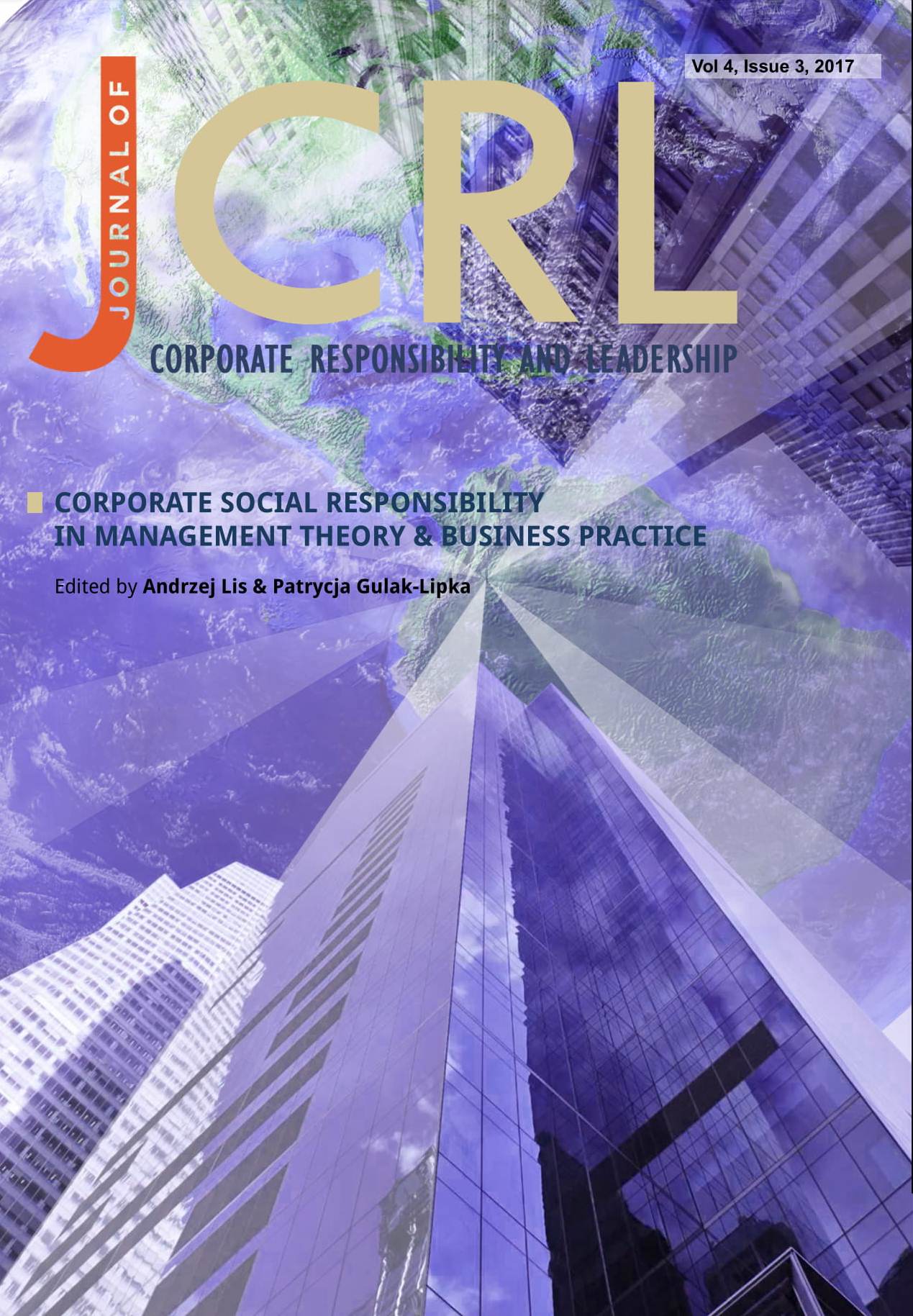Sustainable Enterprise and Sustainable Organisation: Mapping the Research Field with Keywords Analysis
DOI:
https://doi.org/10.12775/JCRL.2017.022Keywords
sustainable enterprise, sustainable organisation, research profiling, keywords analysisAbstract
Purpose: The aim of the paper is to identify the key research top-ics and to contribute to mapping the research on the concepts of a sustainable enterprise and a sustainable organisation.
Design/methodology/approach: Keywords analysis, considered as an element of research profiling methodology, is used to achieve the aim of the study. The research sample comprises bibliometric data retrieved from the Scopus database.
Findings: The publications included in both research samples (i.e. these studying of sustainable enterprises and those related to sus-tainable organisations) focus their primary attention on the issues related to sustainability and CSR. Nevertheless, some interesting differences have been observed. Sustainable enterprise studies are found to be more oriented to strategic management perspective as well as natural environment and ecology. On the other hand sustainable organisation research shows more tendency to deal with the issues of organisational learning and innovation as well as relationships with external stakeholders.
Research and practical limitations/implications: The study is an element of the wider research project aimed at mapping the research on the concepts of a sustainable enterprise and a sus-tainable organisation. As such it triangulates with other papers identifying key research topics within the field through different methods e.g. systematic literature review, research profiling and citation analysis.
Originality/value: The originality of the study results from the novelty of research methodology (i.e. keywords analysis) applied to map the research on the concepts of a sustainable enterprise and a sustainable organisation.
Paper type: bibliometric descriptive study.
References
DeSimone, L., Popoff, F. (1997), Eco-Efficiency: The Business Link to Sustainable Development, MIT Press, Cambridge.
Dess, G.G., Lumpkin, G.T. (2005), “The Role of Entrepreneurial Orientation in Stimulating Effective Corporate Entrepreneurship”, Academy of Management Executive, Vol. 19, No. 1, pp. 147 – 156.
Elkington, J. (1997), Cannibals with Forks: The Triple Bottom Line of Sustainable Development, Chapstone Publishing, Oxford.
Freeman, R.E., Velamuri, S.R (2006), “A New Approach to CSR: Company Stakeholder Responsibility”, in: Kakabadse, A., Morsing, M. (Eds.), Corporate Social Responsibility: Reconciling Aspiration with Application, Palgrave McMillan, New York, pp. 9 – 23.
Golob, U., Podnar, C. (2014), “Critical Points of CSR -related Stakeholder Dialogue in Practice”, Business Ethics – A European Review, Vol. 23, Issue 3, pp. 248 – 257.
Kaplan, J.M., Warren A.C. (2010), Patterns of Entrepreneurship Management, John Wiley & Sons, Inc., New Jersey.
Lis, A., Czerniachowicz, B., Wieczorek-Szymańska, A. (2017), “Leadership and Corporate Social Responsibility: Research Topic Profiling”, in: Nalepka A., Ujwary-Gil A. (Eds.), Business and Non-profit Organizations Facing Increased Competition and Growing Customers’ Demands, Wyższa Szkoła Biznesu – National Louis University, Nowy Sącz, pp. 59 – 74.
Martinez, H., Jaime, A., Camacho, J. (2012), “Relative Absorptive Capacity: A Research Profiling”, Scientometrics, Vol. 92, Issue 3, pp. 657 – 674.
O’Riordan, L., Fairbrass, J. (2008), “Corporate Social Responsibility (CSR): Models and Theories in Stakeholder Dialogue, Journal of Business Ethics, Vol. 83, Issue 4, pp. 745 – 758.
Parrish, B.D. (2007), “Designing the Sustainable Enterprises”, Futures, Vol. 39, Issue 7, pp. 846 – 860.
Porter, A.L., Kongthon, A., Lu, J.-C. (2002), “Research Profiling: Improving the Literature Review”, Scientometrics, Vol. 53, Issue 1, pp. 351 – 370.
Rainey, D.L. (2008), Sustainable Business Development: Inventing the Future through Strategy, Innovation, and Leadership, Cambridge University Press, Cambridge.
Rudnicka, E.A. (2012), “New Approaches to Strategy for a Sustainable Corporation”, in: Hejduk, I., Grudzewski, W.M. (Eds.), Sustainable Enterprises of the Future, Fabryka Druku Sp. z o.o., Pittsburgh-Warsaw.
Stiloge, J., Owen, R., Macnaghten, P., Gorman, M., Fisher, E. Guston, D. (2013), “A Framework for Sustainable Innovation”, in: Owen, R., Bessant, J., Heintz, M. (Eds.), Responsible Innovation: Managing the Responsible Emergence of Science and Innovation in Society, John Wiley & Sons, London, pp. 27 – 50.
Downloads
Published
How to Cite
Issue
Section
Stats
Number of views and downloads: 700
Number of citations: 0



